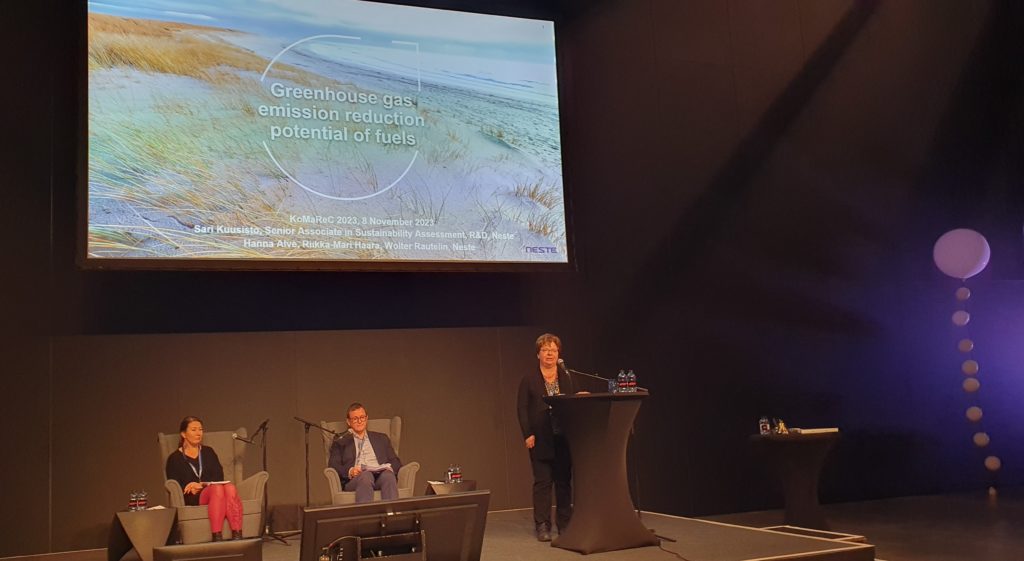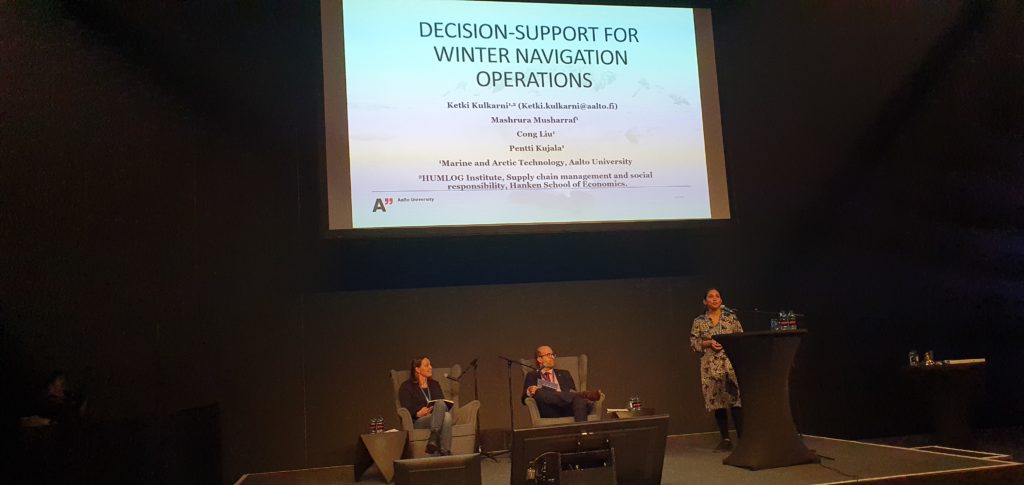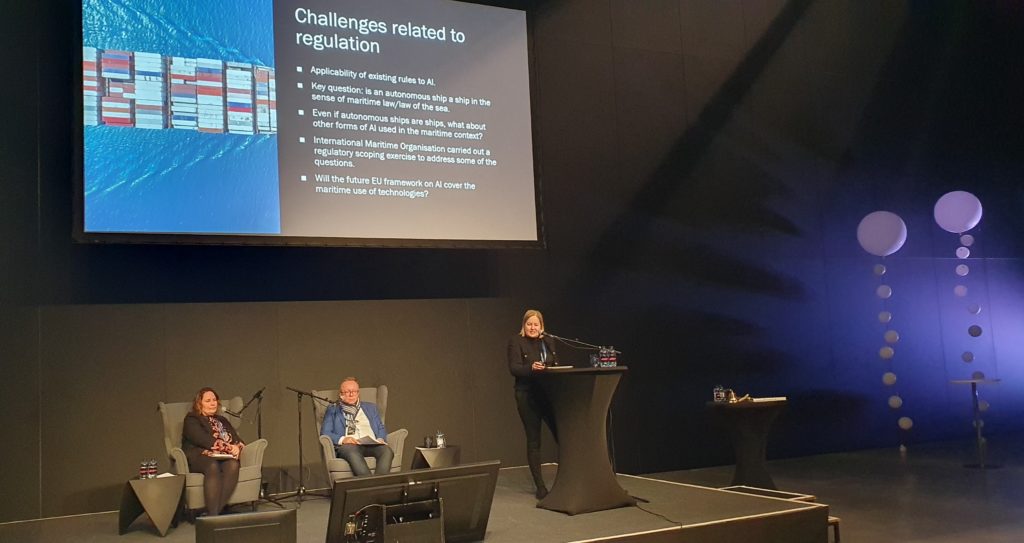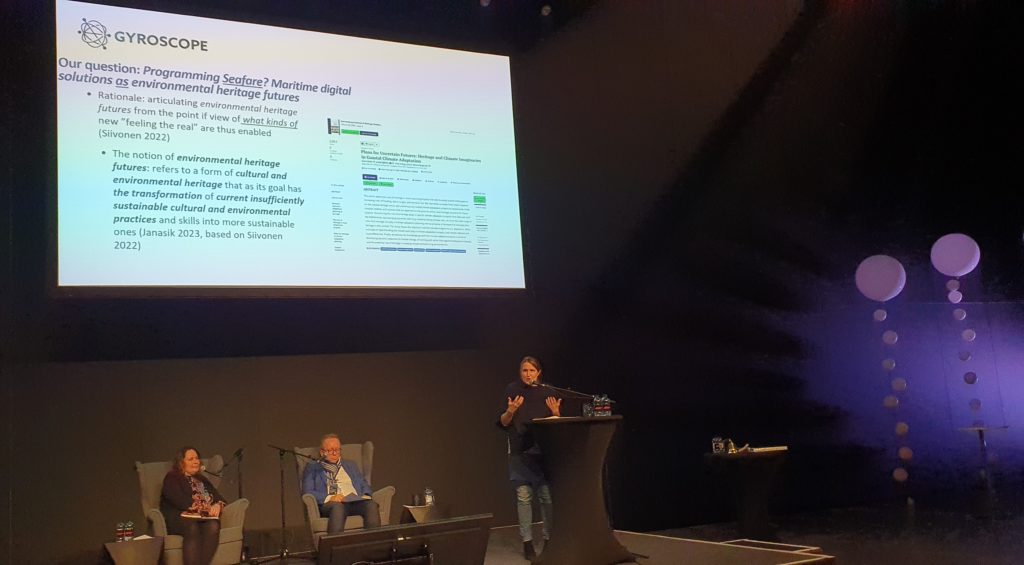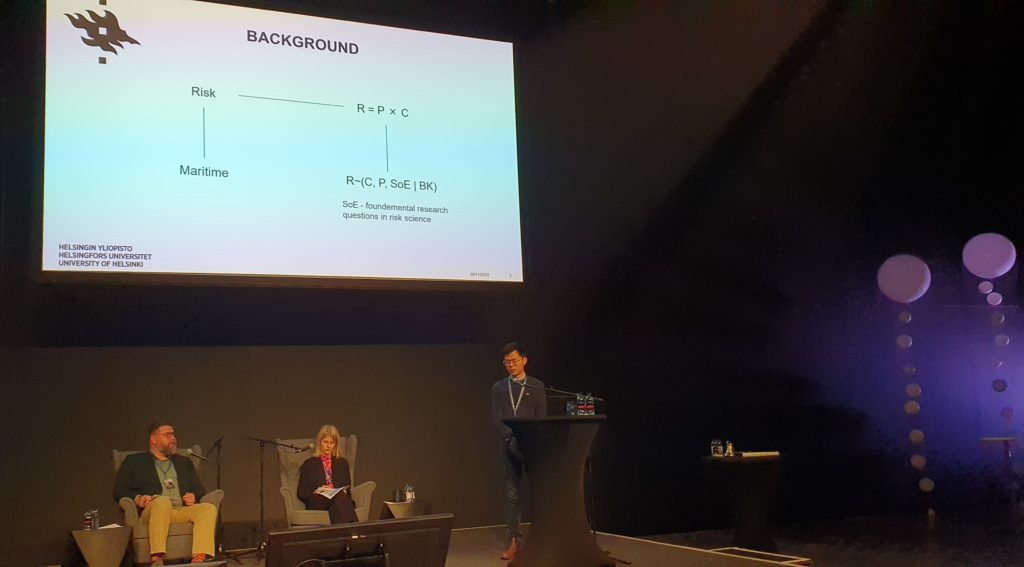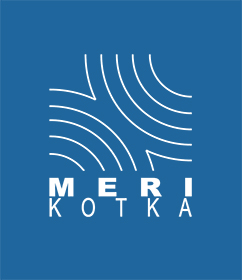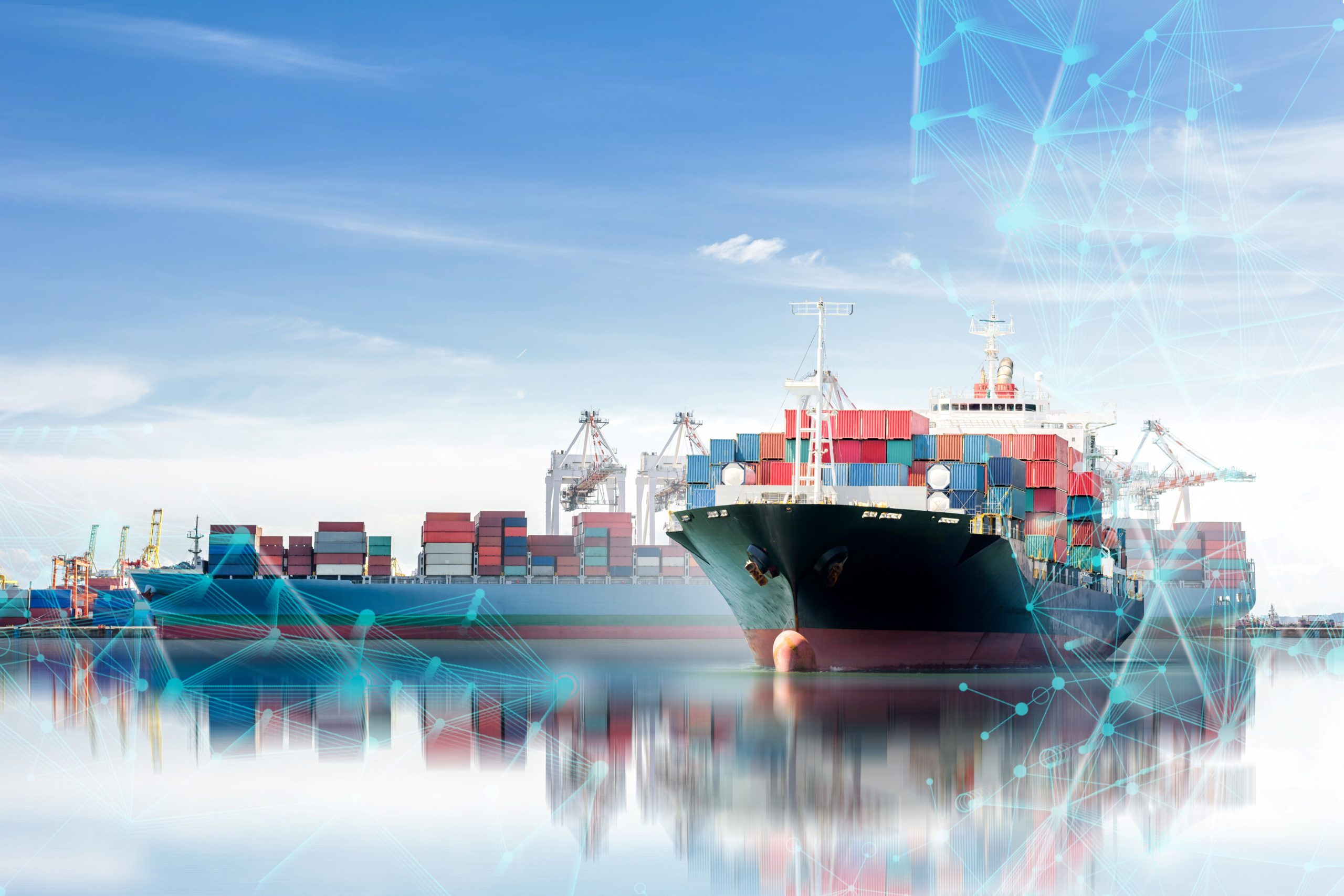The first Kotka Maritime Research Conference (Komarec) focusing on sustainable development of maritime operations was successfully concluded. The event took place on November 8-9, 2023, at the new Event Centre Satama in Kotka. The planning of the conference began early in the spring, and the implementation involved the expertise of researchers from the Merikotka Research Network, representatives of stakeholders, and professionals from Satama’s event management team.
One of the central goals defined for Komarec was to bring together researchers, authorities, companies, and interest groups – all the stakeholders whose collaboration is essential for the sustainable development of maritime transport and shipping – to share knowledge and discuss possible ways to promote more sustainable maritime practices. Approximately 80 participants attended the conference, representing a comprehensive range of target audiences. Of the attendees, 57% were from research and educational organizations, while the remaining 43% represented stakeholder organizations. In total, 14 research and educational organizations and 21 stakeholder organizations were represented. In line with the international nature of both maritime operation and scientific research, the conference language was English, and international participants were also sought. Despite the majority of the multi-cultural audience represented various Finnish organizations, conference attendees also came from Estonia, Poland, and Canada.
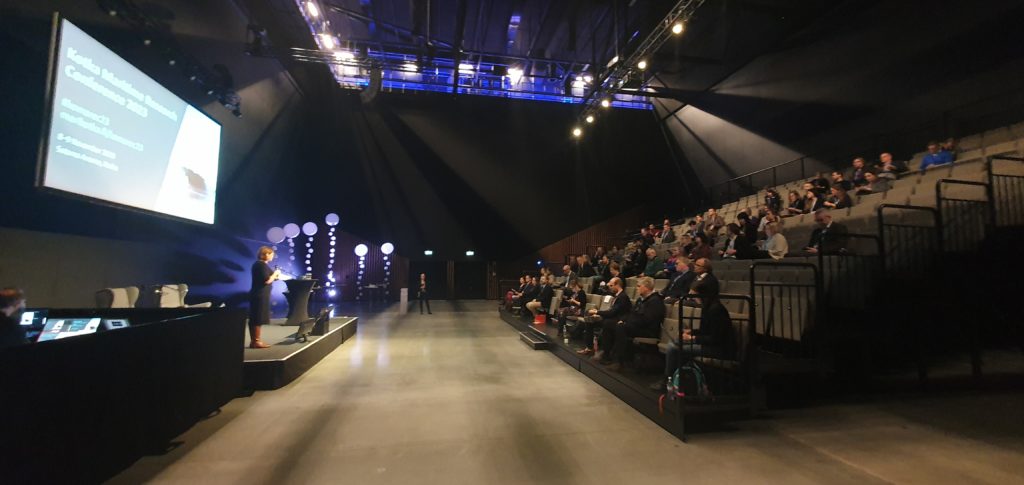
Cross-Sectoral Encounters
The conference was opened by the Development Director of the City of Kotka, Toni Vanhala, who welcomed both the Komarec event and its participants to Kotka. The keynote speaker of the first day came all the way from Canada: Assistant Professor Floris Goerlandt from Dalhousie University shared insights into ongoing work on sustainable maritime development in Canada with the conference attendees. The second day of the conference was opened by the Executive Secretary of the Baltic Marine Environment Protection Commission (HELCOM), Rüdiger Strempel, who provided an overview of HELCOM’s work in developing environmentally sustainable maritime activities.
In the researchers’ presentations, the spectrum of perspectives to more sustainable maritime transport was pleasantly multidisciplinary and extensive, covering environmental issues, the development of technical tools, optimization of operations, human factors, and legislation. The presentations were divided into four thematic sessions. The themes included the environmental impacts of maritime transport, energy-efficient winter navigation, “smart” – i.e. automated and artificial intelligence-driven – maritime traffic and ports, as well as the significance of risk assessment and learning in developing maritime safety.
The session chairs moderating the thematic sessions represented crucial stakeholders in maritime affairs in Finland. The chairs included Eero Hokkanen from the Ministry of Transport and Communications, Mirka Laurila-Pant from the Finnish Transport and Communications Agency Traficom, Helena Orädd from the Finnish Transport Infrastructure Agency, Mats Björkendahl from the Finnish Shipowners’ Association, Mia Hytti from the Baltic Sea Action Group, Päivi Brunou from the Mechanical Engineering and Metals Industry Standardization in Finland, and Ilkka Rytkölä from Meyer Turku Ltd. The perspective of maritime education was represented by Olli-Pekka Brunila, Director of Education in Logistics and Maritime at South-Eastern Finland University of Applied Sciences.
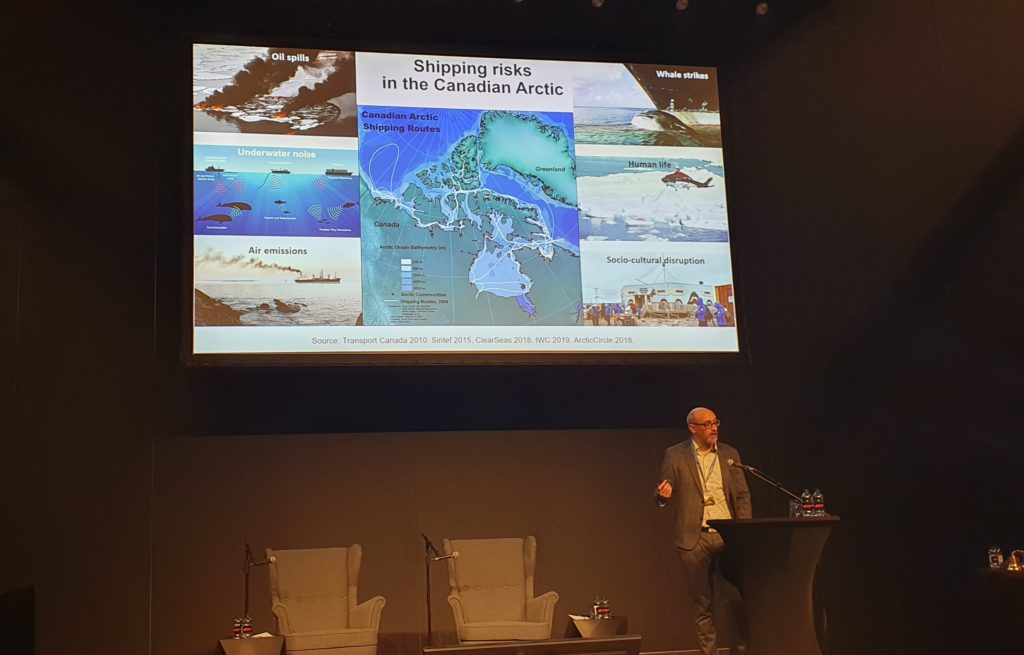
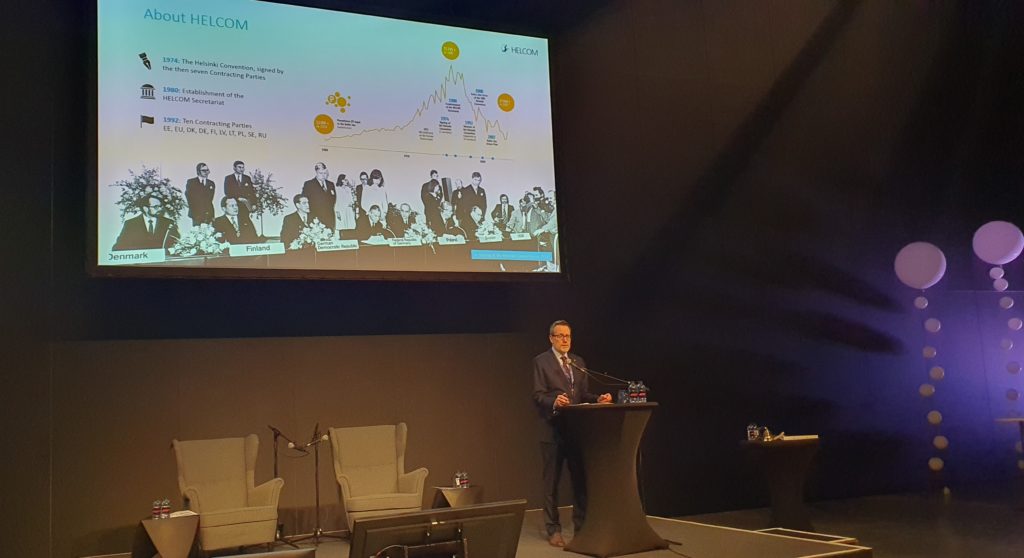
Communication, Anticipation, and Systemic Understanding as Enablers of Sustainable Green Transition
Through interdisciplinary and cross-sectoral dialogue, the Komarec conference aimed to map and increase awareness of research related to the sustainability and sustainable development of maritime transport. We wanted to generate discussions about the societal impacts of the presented research questions and results and collectively identify future knowledge needs.
Discussions held between the conference presentations emphasized the importance of collaboration and communication at national, Baltic Sea region, EU, and IMO levels, as well as on the cross-sectoral level among researchers, business, authorities, and policymakers. Together, we also observed how terms can sometimes have very different meanings in different contexts. This highlighted the importance of context-specific clarification of terms as part of sustainability discussions.
Also in the maritime sector, the Green Transition is discussed a lot. Research can help develop solutions and pathways for implementing the transition in a sustainable manner: ethically and justly, minimizing economic losses. Maritime transport itself contributes to achieving UN Sustainable Development Goals by serving social well-being, enabling the movement of people and goods, and promoting positive economic development. However, for the activity to be considered sustainable, it should succeed without compromising the state of the environment or jeopardizing human safety and other societal values, such as equality and human rights. This is a global challenge across all sectors, and addressing it requires bringing together different perspectives and identifying the connections and collaboration needs between them.
In the Komarec conference, the need and importance of a shared situational picture emerged clearly, particularly in the context of the increasing use of artificial intelligence and automation in maritime transport. Various artificial intelligence solutions can help reduce the negative environmental impacts of maritime transport and improve operational cost-effectiveness. However, beyond technical development, it is essential to proactively consider the risks associated with the introduction of new AI innovations, and how legislation, liability distribution, and infrastructure should be developed to enable sustainable evolution of maritime automatization. One crucial question, especially with the increasing use of artificial intelligence, is the well-being of operational personnel and the identification of new skill requirements: how these can be ensured as part of the development.
Looking Toward the Future of Komarec
The shared vision of the Merikotka research network is to promote comprehensive sustainable development in maritime transport through scientific collaboration and societal dialogue. The Komarec conference supports this goal by providing a platform for dialogue, visibility for research, and an opportunity to identify future research and development needs. The interdisciplinary and cross-sectoral format prompted researchers to carefully consider how to present their research topics and findings in a way that is understandable to all, and based on our feedback survey, this was perceived as beneficial by the researchers themselves. The active participation of stakeholders ensured that researchers’ work was scrutinized also from the perspective of its societal significance. Such expansion of perspective is particularly valuable for researchers in the early stages of their careers.
Based on the positive feedback received, we can state that the first Komarec event was successful. We also received several good suggestions for improvement for future editions. It was encouraging to see that there is a perceived need for the event. Building on this experience, we dare to promise that the conference will be developed into a regularly occurring, increasingly international, and possibly larger event that provides meaningful content and engagement for all stakeholders interested in sustainable development in maritime transport while maintaining a focus on high-quality research.
